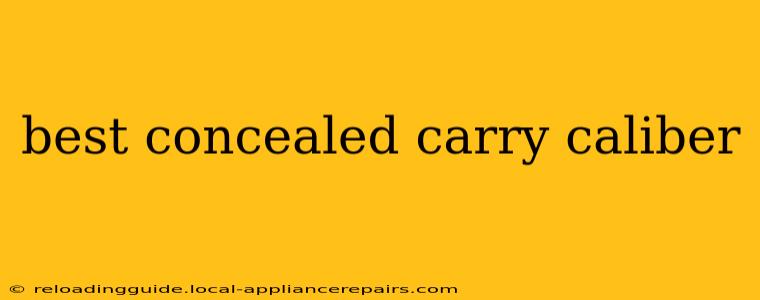Choosing the best concealed carry caliber is a deeply personal decision, heavily influenced by individual factors like hand size, shooting experience, and comfort level. There's no single "best" caliber, but rather a range of excellent options, each with its own strengths and weaknesses. This guide will explore some popular choices, helping you make an informed decision based on your specific needs.
Factors to Consider When Choosing a Concealed Carry Caliber
Before diving into specific calibers, let's examine the key factors that should inform your choice:
-
Ballistics: This encompasses factors like bullet weight, velocity, and energy. Higher energy generally means greater stopping power, but it also often results in more recoil.
-
Recoil: Excessive recoil can negatively impact accuracy, especially in stressful situations. A manageable recoil is crucial for consistent shot placement.
-
Capacity: Magazine capacity affects how many rounds you can fire before reloading. Higher capacity offers more shots, but it might also lead to a larger and bulkier firearm.
-
Concealability: The size and weight of the firearm directly impact how easily it can be concealed. Smaller calibers generally allow for smaller, more easily concealable handguns.
-
Personal Preferences and Experience: Your comfort level with a particular firearm and caliber is paramount. Choose a caliber you can shoot accurately and consistently.
Popular Concealed Carry Calibers: A Detailed Look
Several calibers consistently rank among the most popular choices for concealed carry. Let's analyze their pros and cons:
9mm Parabellum: The Versatile Workhorse
The 9mm is arguably the most popular concealed carry caliber. Its widespread availability, relatively low recoil, and manageable size make it an excellent choice for both new and experienced shooters.
Pros:
- Widely available: Ammunition is readily available and relatively inexpensive.
- Moderate recoil: Easy to control, even for smaller shooters.
- High capacity: Many 9mm handguns offer high-capacity magazines.
- Good accuracy: Offers reliable accuracy at typical self-defense ranges.
Cons:
- Stopping power debate: While effective, some argue it lacks the stopping power of larger calibers. This is often debated, and the effectiveness depends heavily on shot placement.
.45 ACP: The Heavyweight Contender
The .45 ACP has long been a favorite among those prioritizing stopping power. Its larger diameter bullet delivers significant energy transfer.
Pros:
- High stopping power: The large bullet diameter and significant energy transfer are generally considered superior for stopping threats.
- Reliable performance: A well-established round with a long history of reliable performance.
Cons:
- Heavy recoil: Can be challenging for smaller shooters to manage.
- Lower capacity: .45 ACP handguns typically have lower magazine capacities than 9mm.
- Larger size and weight: Can be less comfortable for concealed carry compared to smaller calibers.
.380 ACP: The Lightweight Option
The .380 ACP is often chosen for its small size and lightweight nature, making it ideal for ultra-concealed carry.
Pros:
- Easy to conceal: Small size and lightweight make it easy to carry discreetly.
- Low recoil: Simple to manage even for less experienced shooters.
Cons:
- Lower stopping power: Generally considered less potent than 9mm or .45 ACP.
- Limited capacity: Magazines tend to have lower capacities.
- Penetration concerns: In some scenarios, the lighter bullet may not penetrate deeply enough to stop a threat.
.40 S&W: A Compromise Between Power and Recoil
The .40 S&W aims to balance stopping power and recoil, falling between the 9mm and .45 ACP.
Pros:
- Good balance of power and recoil: A compromise between the two extremes.
- Relatively high stopping power: Generally more powerful than 9mm.
Cons:
- Higher recoil than 9mm: Can be more challenging to control than a 9mm.
- Can be more expensive than 9mm: Ammunition prices are often higher.
Conclusion: The Best Caliber is Personal
Ultimately, the best concealed carry caliber depends on your individual circumstances and preferences. Consider the factors discussed above, research various handguns in your chosen caliber, and spend time at a shooting range testing different options to find the firearm and caliber that you are most comfortable and proficient with. Remember that responsible gun ownership includes proper training and a deep understanding of your chosen firearm and caliber's capabilities and limitations. Consult with experienced firearm instructors and professionals to make the most informed decision for your safety and self-defense.

